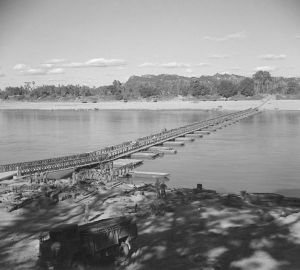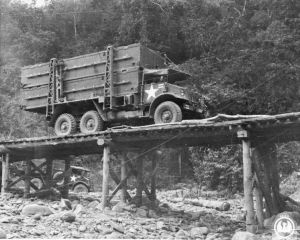
The camp was always full, often with a sizable overflow which had to be accommodated in the open. With the monsoon fast approaching and rumours of the Japanese consolidating their position around Mandalay I was anxious to see the marching columns into Manipur without dawdling too long in Tamu. At times I even ‘bribed’ some of the younger groups to cross over into India after just the night’s rest by offering them double rations for their co-operation. A large number accepted the proposition without demur which helped considerably both at my end as well as in Palel and Imphal and in halting spots in between. Fortunately, I had been able to establish cordial relations with all the surrounding villages and had been promised their bullock-carts on hire up to Palel as and when required. Many groups with large numbers of women and children were anxious to hire the bullock carts to carry their belongings as well as the older women and children up the hill to Palel from where the Army was ready to transport the women and children to Imphal, another 30 miles. The men would have to march the distance & pick up their families at one of the several large Relief Camps around Imphal – a dubious proposition about which I had serious misgivings.
Whilst all this was going on, I woke up one morning to find a PWD messenger waiting for me with a message from the District Collector

at Kalewa (on the Chindwin River) warning me that he had despatched two lorry loads of women in an advanced stage of pregnancy to Tamu and requesting me to meet the lorries some 20 miles south of Tamu and ensure their ‘welfare’ over the last stretch.
As luck would have it, the camp doctor and his assistant had both been re-called to Kalewa a few days back and we had been left with no medical cover. My only hope was the Army. I immediately sent a message to the Army camp at Imphal with one of my ‘runners’ explaining the emergency and requesting suitable medical help at the earliest – i.e the next morning. After that I set out for the rendezvous at about 7 AM reaching the designated village at about 1 PM. As I waited on the track watching the refugees trudging patiently along, my attention was suddenly drawn to the peculiar behaviour of a small group of 4 including to two small children – 6 & 2 years of age – which took the following pattern. The couple carried bundles slung across their shoulders even though the wife in her mid-twenties looked far too frail for the size of the load she carried. This is what I saw. The man, also in his mid-20s, would carry the son and the bundle about 150 yards, leave the son and bundle by the track and trek back to relieve his wife of her bundle, pick up the little girl and literally assist his wife to the “son and bundle” and after a short breather start the process all over again.
I watched two full cycles of this heart-warming display of love and courage and then decided to intervene. Going up to the couple I asked them how long this had been going on and was told that they had followed this pattern in stretches right down from Kalewa a distance of 20 miles in order not to be left too far behind their group. They had started out from Moulmein some 3 months back and malnutrition and fatigue had taken their toll of the young woman who seemed to be on the verge of collapse.
Many of the refugees passing by had obviously seen me in Mandalay and managed to raise their hands in a tired salute and then, suddenly, I was in luck. I saw a largish group of about 20 men, women and children walking up to where I was standing and the oldest suddenly stopped and without a word opened his arms to me. I went up and embraced him heartily for I remembered him with some respect. He had come to me for an air passage for his mother and ailing wife and only after I had approved the tickets, had offered to pay for 2 deserving women by the same flight.
After some talk, he told me that his daughters were no longer fit to walk and in any case were unable to carry their share of the baggage; could I help him to hire a couple of carts. By this time I had established a special relationship with all the village headmen in the area and had no difficulty in getting the two carts to everyone’s advantage since my friend was prepared to pay well. I made just one condition and it was accepted on the spot. The young wife and her kids found a place in the carts and the head of the family walked beside it probably reassured that no night could hold back the Sun, from rising.

It was almost 3 p.m. and the 2 lorries over due. I heard their rumbling in due course and as they were brought to a halt, I was faced by a grim-faced lady with greying hair and a no-nonsense approach to things.
She gave me a brief report on the passenger-list from which I gathered that there was every possibility of additions to our population before the day was done. Had a few cups of Burmese tea and then set out to make the 20 miles back to Camp before sun-down. I was in the second lorry and we must have travelled hardly six miles when I noticed some commotion in the well of the leading vehicle which soon came to a screeching halt. We did the same and as I jumped down, the old lady grabbed me by the arm and demanded that I help her with the job in hand. I asked her what it was and she screamed that we had a delivery on our hands. It was like somebody dropping a rock on my head. I wanted to know what I was expected to do and was told firmly to obey instructions; she knew her job. She asked me to produce two items without delay. Steaming hot water in a CLEAN utensil and a sharp instrument to be disinfected with some stuff she carried in a bottle.
From noises within the truck, it was obvious that we had not much time to lose. I told the driver to prepare to drain out the boiling water from the radiator and managed to get hold of a basin and some clean material from the lady’s capacious basket to filter out the hot water as best we could. The water was hot but most certainly far from fit for a delivery case. We were almost at panic stations by now, so I just mumbled something which sounded like a prayer and took up battle stations next to the Boss. The sharp instrument, by the way, was to be my Bowie knife – razor sharp and spotlessly clean. I was alone with the old lady and one of the passengers who was in no immediate danger of turning into a patient herself.
The old lady knew what she was about and I soon had the proud privilege of representing the Government of India on the proud occasion of the birth of one of its citizens. I was asked to produce the sharp instrument and the final act was performed. I could claim to be part of an active Gynaecological team with field experience. We were on the road again after an hour or so but had hardly run a couple of miles before the whole process had to be repeated. However, by now I was an expert with field experience and managed to produce all the right things at the right time without too much persuasion. We reached Camp at 8 p.m. having taken 5 hours to cover 20 miles, I felt ridiculously proud at receiving a ‘shabash’ from the Old Lady and still cherish that experience with some pride.
I have forgotten to mention the day’s tally in terms of specifics. The first was a boy whose mother was a Muslim lady from U.P. The second, a girl, belonged appropriately to a Hindu lady also from U.P. We kept them in Camp for 4 days and I then arranged with the Army to relay them to the Main Hospital in Dimapur for complete recovery and onward ‘transmission’ to their homes. Of the other 18, 12 had their babies in the Camp under the Army’s medical supervision. All went well and It was a joy to see them all safely into Indian territory in the tender care of the Indian Army.
